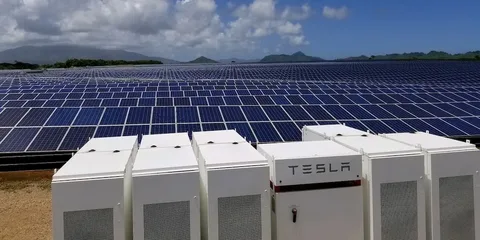As the global population continues to grow and the need for reliable, sustainable energy sources increases, the importance of renewable energy technology cannot be overstated. Solar battery storage is at the forefront of this movement, potentially revolutionizing how they think about and use energy. We’ll discuss the potential benefits of best solar battery storage, and why it’s the perfect fit for the green energy revolution. So, let’s begin exploring how solar battery storage is powering the future!
The Current State of Energy Consumption
As our world becomes increasingly dependent on technology and electricity, energy consumption rises alarmingly. Burning fossil fuels for energy is the leading cause of air pollution and greenhouse gas emissions, leading to environmental degradation and climate change. Additionally, traditional power grids are vulnerable to outages and failures due to aging infrastructure, natural disasters, and cyber-attacks. The need for clean, reliable, and sustainable energy sources has never been greater.
The good news is that solar battery storage technology advancements are changing the game. Solar battery storage allows for storing excess solar energy generated during the day for use during periods of low sunlight or high energy demand.
What Is Solar Battery Storage?
Solar battery storage is a technology that allows homes and businesses to store excess energy generated by solar panels. The system comprises batteries, inverters, and charge controllers that work together to store the electricity generated by the solar panels for later use. It converts solar energy into usable electricity, enabling households to rely less on the grid.
The solar battery storage system works by charging during the day when the sun is out, and electricity demand is low. It then releases the stored energy when high demand or the sun isn’t shining. With a solar battery storage system, homes and businesses can significantly reduce their reliance on the grid and save on their energy bills.
More Scalable
Solar battery storage technology has improved dramatically, making it more efficient and affordable. As more people turn to renewable energy, solar battery storage has become a more viable solution to reduce reliance on traditional power sources. In addition, advancements in technology have also allowed for solar battery storage to become more scalable, allowing it to be implemented in larger commercial and industrial applications.
Overall, solar battery storage has revolutionized energy consumption, enabling homeowners and businesses to reduce their carbon footprint while saving on energy bills.
Benefits of Solar Battery Storage
Solar battery storage has several benefits, including increased energy independence, cost savings, and reduced carbon emissions.
Firstly, solar battery storage allows homeowners and businesses to rely less on the grid than on stored solar energy. This can increase energy independence and security, especially during power outages or emergencies.
Secondly, solar battery storage can also save consumers money on electricity bills. By storing excess solar energy during peak hours and using it during off-peak hours, consumers can avoid higher electricity rates during peak hours.
Finally, using solar battery storage can reduce carbon emissions, as it allows for the storage and use of clean, renewable energy. This can positively impact the environment and contribute to a more sustainable future.
Solar Battery Storage Systems: Cost Considerations
When implementing a solar battery storage systems, the cost is a crucial factor to consider. While the upfront cost may seem high, looking at the long-term savings that can be achieved through reduced reliance on the grid and lower energy bills is important.
The cost of a solar battery storage system depends on several factors such as the size of the system, the brand, and the level of functionality.
Maintenance and Replacement of the Battery
While the initial investment can be daunting, it is essential to consider the incentives and rebates available for solar battery storage installations. Some states offer tax credits or cash incentives that can offset the cost of the system. Another cost consideration is the maintenance and replacement of the battery. Batteries typically have a lifespan of 10-15 years, so it is essential to factor in the cost of replacement when considering the total cost of ownership.
Overall, battery storage systems offer a cost-effective and environmentally-friendly solution to reducing energy consumption and reliance on the grid. Businesses and homeowners can make informed decisions when investing in solar battery storage technology by carefully considering the costs and incentives available.
Applications of Solar Battery Storage
Solar battery storage has a wide range of residential, commercial, and industrial applications. One of the most common applications is to use solar batteries as a backup power source during power outages. Solar battery systems can automatically switch on when the grid goes down and provide uninterrupted power supply until grid power is restored.
In commercial and industrial settings, solar battery storage can help reduce peak energy demand charges by storing energy during off-peak hours and supplying it during peak demand. This can result in significant cost savings on energy bills.
Provide Reliable and Sustainable Power for Homes
Another key application of solar battery storage is in remote or off-grid areas, where traditional power infrastructure is unavailable or too expensive to install. Solar battery systems can provide reliable and sustainable power for homes, schools, healthcare facilities, and other critical services.
Solar battery storage is also being used in transportation applications, such as electric vehicles and charging stations. By storing energy from solar panels and charging stations, electric vehicles can run longer on a single charge and reduce their carbon footprint.
Overall, the applications of solar battery storage are vast and varied, making it a versatile solution for a wide range of energy needs. As the technology continues to evolve and become more affordable, they can expect to see even more innovative uses for solar battery storage in the future.
Advancements in Solar Battery Storage Solutions
As solar technology has continued to advance, so have solar battery storage solutions. Today, you see innovative, more efficient, reliable and cost-effective systems than ever before.
One notable development is the integration of smart technology. Many battery storage systems now have intelligent energy management software to monitor energy usage patterns, forecast energy demand, and automatically switch to battery power when the grid is down. This allows for greater control and optimization of energy usage, helping to maximize the use of renewable energy and minimize reliance on the grid.
 Large-Scale Commercial Installation
Large-Scale Commercial Installation
Another advancement is the increase in battery storage capacity. This allows for more power to be stored and used later, making it possible for homeowners and businesses to store excess energy produced by solar panels during the day and use it at night or when solar energy production is low.
Additionally, battery storage systems are becoming more scalable, allowing them to be installed in various applications. Whether a small residential system or a large-scale commercial installation, advancements in battery storage solutions make it easier and more cost-effective than ever to adopt solar technology.
Overall, these advancements in battery storage solutions make it easier for individuals and businesses to adopt solar energy and help to reduce our reliance on fossil fuels.
The Future of Solar Battery Storage and Energy Consumption
As the world moves towards more sustainable energy solutions, the future of solar battery storage looks promising. The technology has already come a long way in efficiency and cost-effectiveness. With more advancements in the pipeline, solar battery storage is expected to become a crucial component in the global energy mix.
One of the key advantages of solar battery storage is its ability to store excess energy generated by solar panels during peak sunlight hours. This means that energy can be used during peak hours, when demand is high, instead of relying on non-renewable energy sources. This reduces the grid load and energy costs for homeowners and businesses.
More Affordable In the Future
Solar battery storage is expected to become even more affordable in the future, making it accessible to a wider range of consumers. There are also ongoing efforts to improve the efficiency of solar panels and battery storage systems, making them even more cost-effective and practical.
As renewable energy sources become more prevalent, solar battery storage will play a critical role in balancing the grid and providing reliable energy to consumers. This will result in a more sustainable, efficient, cost-effective energy system, leading to a brighter future for all.
FAQS
Q: What Is The Lifespan Of A Solar Battery Storage System?
A: The lifespan of a solar battery storage system typically ranges from 10 to 15 years, depending on usage and maintenance.
Q: Can Solar Battery Storage Systems Be Installed In Homes?
A: Solar battery storage can be installed in homes to provide backup power during outages or offset peak electricity usage.
Q: Do Solar Battery Storage Require Maintenance?
A: Solar battery storage require periodic maintenance, including cleaning and monitoring the system’s performance.
Q: Are Solar Battery Storage Cost-Effective?
A: While solar battery storage can have a high upfront cost, they can save long-term costs by reducing reliance on the grid and minimizing electricity bills.
Q: What Happens To Excess Energy Produced By A Solar Battery Storage System?
A: Excess energy produced by a solar battery storage system can be stored in the batteries or sent back to the grid for credit.
Conclusion
As you have seen, solar battery storage is rapidly changing how they consume energy, providing more efficient, reliable, and sustainable alternatives to traditional fossil fuels. With the ongoing advancements in technology and innovation, they can expect to see more affordable and accessible solar battery storage solutions. By using solar battery storage, they can harness the power of the sun to create clean and renewable energy readily available to power our homes and businesses. This reduces our reliance on non-renewable energy sources, such as coal and oil, and helps to reduce greenhouse gas emissions.



